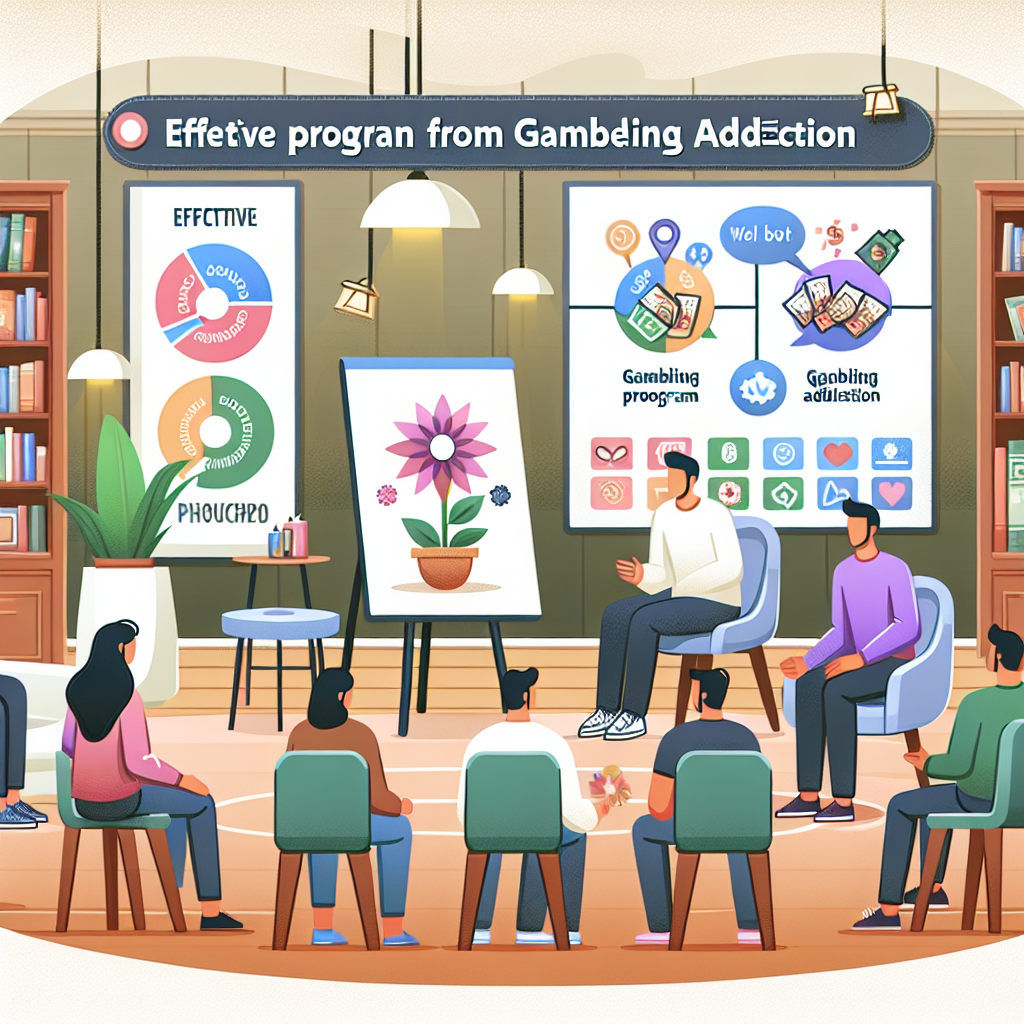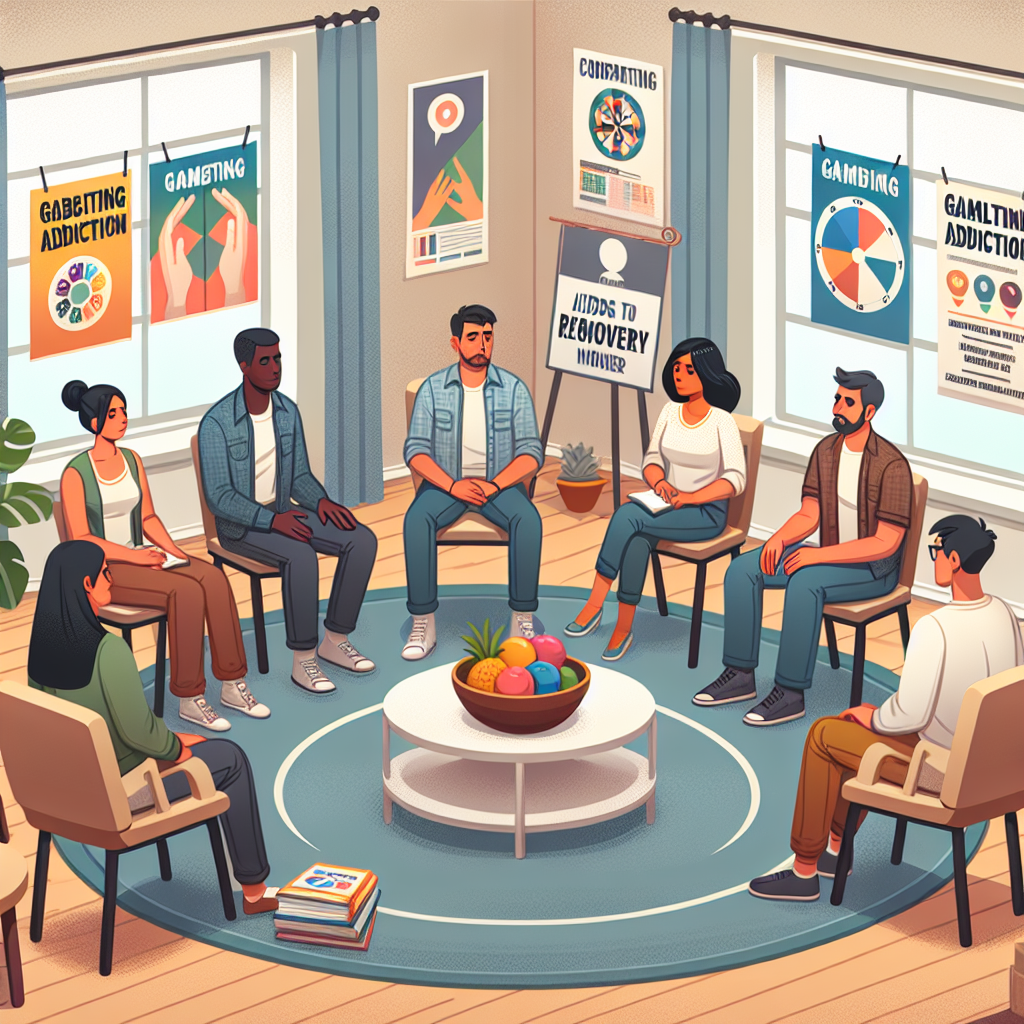-
Table of Contents

“Find Hope and Healing: Effective Programs for Gambling Addiction Recovery”
Introduction
Gambling addiction, also known as compulsive gambling or gambling disorder, is a serious condition that can have devastating effects on an individual’s life, including financial ruin, relationship breakdowns, and mental health issues. Fortunately, there are several effective programs designed to help individuals recover from gambling addiction. These programs often incorporate a combination of therapeutic approaches, support groups, and sometimes medication to address the complex nature of the disorder. Cognitive-behavioral therapy (CBT) is commonly used to help individuals identify and change unhealthy gambling behaviors and thought patterns. Support groups such as Gamblers Anonymous provide a community of individuals who share similar experiences and can offer mutual support and encouragement. Additionally, some programs may include financial counseling to help individuals manage their finances and avoid future gambling-related problems. Overall, these programs aim to provide comprehensive support to help individuals overcome their addiction and lead healthier, more fulfilling lives.
Exploring Effective Programs for Gambling Addiction Recovery
Gambling addiction, often referred to as compulsive gambling or gambling disorder, is a serious condition that can have devastating effects on an individual’s life, relationships, and financial stability. However, there is hope for those struggling with this addiction, as numerous effective programs are available to aid in recovery. These programs are designed to address the complex nature of gambling addiction, offering a combination of therapeutic approaches, support systems, and practical tools to help individuals regain control over their lives.
One of the most well-known and widely utilized programs for gambling addiction recovery is Gamblers Anonymous (GA). Modeled after the successful Alcoholics Anonymous (AA) program, GA provides a supportive community where individuals can share their experiences, challenges, and successes. The program follows a 12-step approach, encouraging participants to acknowledge their addiction, seek help, and make amends for any harm caused by their gambling behavior. The sense of camaraderie and mutual support found in GA meetings can be incredibly empowering, helping individuals feel less isolated and more motivated to stay on the path to recovery.
In addition to peer support groups like GA, professional counseling and therapy play a crucial role in gambling addiction recovery. Cognitive-behavioral therapy (CBT) is particularly effective in treating gambling addiction, as it helps individuals identify and change the thought patterns and behaviors that contribute to their compulsive gambling. Through CBT, individuals learn to recognize triggers, develop healthier coping mechanisms, and build resilience against the urge to gamble. Therapists may also employ other therapeutic techniques, such as motivational interviewing and mindfulness-based strategies, to further support the recovery process.
Moreover, residential treatment programs offer a more intensive approach for those who require a structured environment to overcome their addiction. These programs typically involve a combination of individual therapy, group therapy, educational workshops, and recreational activities, all designed to promote holistic healing. By removing individuals from their usual environment and providing round-the-clock support, residential treatment programs can help break the cycle of addiction and lay a strong foundation for long-term recovery.
Another effective component of gambling addiction recovery is financial counseling and management. Since financial problems are often a significant consequence of compulsive gambling, addressing these issues is essential for a successful recovery. Financial counselors can assist individuals in creating a budget, managing debt, and developing a plan to rebuild their financial stability. This practical support not only alleviates some of the stress associated with financial difficulties but also reinforces the individual’s commitment to recovery by demonstrating tangible progress.
Furthermore, family therapy and support are vital aspects of the recovery process. Gambling addiction can strain relationships and create a sense of mistrust and resentment among family members. Family therapy sessions provide a safe space for open communication, allowing family members to express their feelings, understand the nature of the addiction, and learn how to support their loved one effectively. Strengthening family bonds and fostering a supportive home environment can significantly enhance the individual’s chances of maintaining long-term recovery.
In conclusion, while gambling addiction is a challenging condition to overcome, there are numerous effective programs available to support individuals on their journey to recovery. From peer support groups and professional therapy to residential treatment programs and financial counseling, these resources offer a comprehensive approach to addressing the multifaceted nature of gambling addiction. By taking advantage of these programs and building a strong support network, individuals can reclaim their lives, restore their relationships, and achieve lasting recovery. The path to overcoming gambling addiction may be difficult, but with the right support and determination, it is undoubtedly possible.
Success Stories: Programs That Work for Gambling Addiction Recovery
Gambling addiction, often referred to as compulsive gambling or gambling disorder, is a serious condition that can have devastating effects on an individual’s life. However, there is hope for those struggling with this addiction, as numerous programs have demonstrated significant success in helping individuals recover. These programs, which range from therapy-based approaches to community support groups, offer a lifeline to those seeking to regain control over their lives.
One of the most well-known and widely respected programs for gambling addiction recovery is Gamblers Anonymous (GA). Modeled after the 12-step program of Alcoholics Anonymous, GA provides a supportive community where individuals can share their experiences and struggles in a non-judgmental environment. The power of peer support cannot be underestimated, as it fosters a sense of belonging and understanding that is crucial for recovery. Many individuals have found that the shared experiences and collective wisdom of the group provide invaluable insights and encouragement, helping them to stay committed to their recovery journey.
In addition to support groups, cognitive-behavioral therapy (CBT) has proven to be highly effective in treating gambling addiction. CBT focuses on identifying and changing the thought patterns and behaviors that contribute to compulsive gambling. Through this therapeutic approach, individuals learn to recognize the triggers that lead to gambling and develop healthier coping mechanisms. Success stories abound of individuals who, through CBT, have been able to break free from the cycle of addiction and rebuild their lives. The structured nature of CBT, combined with the personalized attention from a trained therapist, makes it a powerful tool in the fight against gambling addiction.
Moreover, residential treatment programs offer an intensive and immersive approach to recovery. These programs provide a structured environment where individuals can focus entirely on their recovery without the distractions and temptations of everyday life. With a combination of therapy, education, and support, residential treatment programs address the physical, emotional, and psychological aspects of addiction. Many individuals who have participated in these programs report significant improvements in their mental health and a renewed sense of purpose and direction.
Another promising avenue for recovery is the use of technology-based interventions. Online therapy and support groups have made it possible for individuals to access help from the comfort of their own homes. These digital platforms offer flexibility and convenience, making it easier for people to seek help regardless of their location or schedule. Success stories from these programs highlight the importance of accessibility and the role of technology in expanding the reach of addiction recovery services.
Furthermore, financial counseling is an often-overlooked but essential component of gambling addiction recovery. Many individuals struggling with gambling addiction face significant financial difficulties, which can exacerbate their stress and hinder their recovery efforts. Financial counseling helps individuals to manage their debts, create a budget, and develop a plan for financial stability. By addressing the financial consequences of gambling addiction, these programs provide a comprehensive approach to recovery that addresses both the emotional and practical aspects of the addiction.
In conclusion, there are numerous effective programs for gambling addiction recovery, each offering unique benefits and approaches. From the supportive community of Gamblers Anonymous to the structured environment of residential treatment programs, and from the personalized attention of cognitive-behavioral therapy to the accessibility of online interventions, these programs provide hope and a path to recovery for those struggling with gambling addiction. The success stories of individuals who have reclaimed their lives through these programs serve as a powerful reminder that recovery is possible, and that with the right support and resources, individuals can overcome the challenges of gambling addiction and build a brighter future.
Q&A
1. **Question:** Are there effective programs for gambling addiction recovery?
**Answer:** Yes, there are effective programs for gambling addiction recovery, including Cognitive Behavioral Therapy (CBT), support groups like Gamblers Anonymous, and inpatient or outpatient rehabilitation programs.
2. **Question:** What is Gamblers Anonymous?
**Answer:** Gamblers Anonymous is a 12-step support group program designed to help individuals with gambling addiction through peer support and shared experiences.
Conclusion
Yes, there are effective programs for gambling addiction recovery. These programs often include cognitive-behavioral therapy (CBT), support groups like Gamblers Anonymous, and sometimes medication to address underlying mental health issues. Comprehensive treatment plans that combine therapy, support, and sometimes medication have been shown to be effective in helping individuals recover from gambling addiction.



